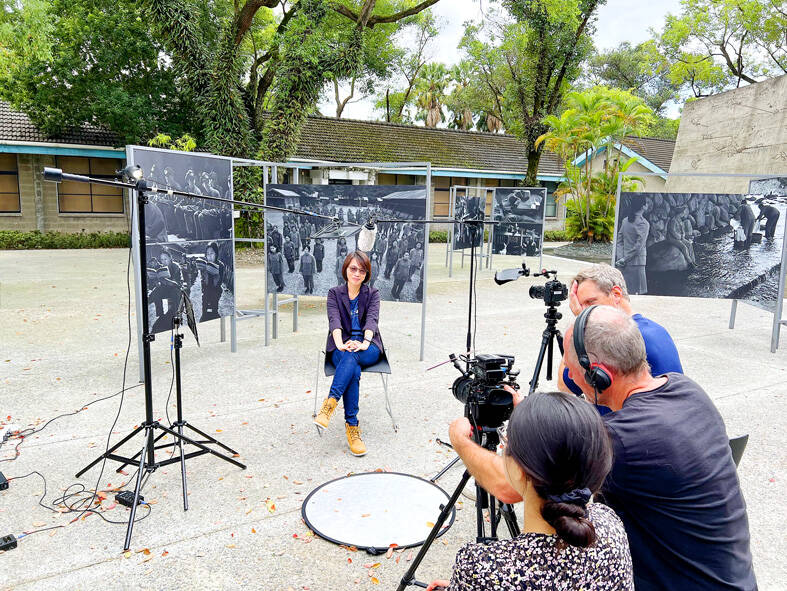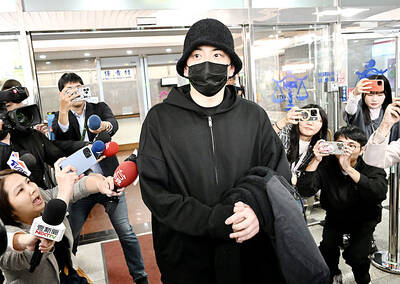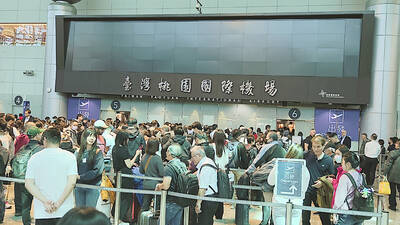What is the identity of Taiwanese?
For Reporter Without Borders president Pierre Haski, Taiwan’s identity has coalesced around the idea of democracy, which led him to make a documentary chronicling how its national identity was formed and has changed since.
In the 53-minute film titled Nous Sommes Taiwan, meaning “We are Taiwan” in French, the 69-year-old journalist explored the evolution of Taiwan’s democracy and illustrated his belief that “Taiwan’s identity” has become a powerful narrative that has given it a voice in the world.

Photo courtesy of Pierre Haski via CNA
Haski said he has visited Taiwan regularly over the past 24 years, adding that his first visit was to cover the run-up to the presidential and legislative elections in 2000.
He said that people increasingly identifying as Taiwanese surprised him most during his most recent visit.
The documentary highlights this shift, which Haski said is evidenced in the results of polls on how Taiwanese identify, as “Chinese,” “Chinese and Taiwanese” and “Taiwanese.”
While only about 20 percent of respondents said they are Taiwanese shortly after martial law was lifted in 1987, that proportion has surged to more than 64 percent today, while the number of respondents identifying as Chinese has dropped to nearly zero, the film says.
Haski said the documentary’s title is intended to reflect this shift, and that even though Taiwanese are divided politically, as well as over several other issues, they share the same collective sense of identity.
To shoot the documentary, Haski conducted interviews in Taiwan on the formation and essence of Taiwanese identity with people who have a wide range of perspectives.
They included Presidential Office spokeswoman Kolas Yotaka, United Microelectronics Corp founder Robert Tsao (曹興誠), Chinese Nationalist Party (KMT) international affairs specialist Wu Liang-i (吳亮儀) and Minister of Digital Affairs Audrey Tang (唐鳳).
People in Taiwan are not just Chinese, or people from China, Kolas says early in the film.
At the beginning there were indigenous people, who were followed by colonizers from Spain, the Netherlands, the Qing Dynasty and Japan, she says.
These different cultures “converged to form new identities, cultures, beliefs and customs,” she says.
Haski also talked to pop culture workers whose viewpoints he said are more representative of the younger generation, such as Zero Chou (周美玲), who directed the movie Untold Herstory (流麻溝十五號), and Ho Shan-jung (何姍蓉), producer of the YouTube channel EYECTV.
In a scene where she holds her friend’s hands in the rain to watch a pride parade concert, Chou says: “A cultural atmosphere like this makes me very proud of our country.”
Haski said Taiwan is facing a major contradiction.
The law and diplomacy are not on Taiwan’s side, given that the legal principles and diplomatic frameworks regarding Taiwan were set 50 years ago, when it was under martial law and the people did not have a voice, he said.
That meant the “one China” concept, in which Taiwan is seen as a part of China, was formed without asking for the opinion of Taiwanese, he said.
However, as Taiwan became democratic in the 1990s, Taiwanese started to show their collective will to defend what they have built and that they do not want to take paths determined by others, Haski said.
While Taiwan is in an unfavorable position in terms of international law, legitimacy and morality are on its side, especially in areas where Taiwanese can make their voices heard, he said.
Bringing that voice and collective will to a European audience was a key reason for making the documentary, he said.
Although Taiwan is diverse and complex, Europeans generally discuss Taiwan in geopolitical terms, such as China’s desire to annex it and its role in the semiconductor supply chain, while lacking exposure to other aspects, Haski said.
“We rarely hear the voices of Taiwanese people themselves,” Haski said. “Not many people in Europe know that Taiwan’s democracy was born out of the people’s fight against dictatorship, or about the complexity of the different groups of people who make up Taiwan.”
Building a national identity around democracy “has allowed Taiwan to construct a society that’s relatively harmonious, that shows respect for ethnic, linguistic and gender minorities. That’s the exact opposite of what’s happening in China,” he said.
The documentary can be streamed on the Web site of French-German TV channel Arte until end of June.

The National Immigration Agency (NIA) said yesterday that it will revoke the dependent-based residence permit of a Chinese social media influencer who reportedly “openly advocated for [China’s] unification through military force” with Taiwan. The Chinese national, identified by her surname Liu (劉), will have her residence permit revoked in accordance with Article 14 of the “Measures for the permission of family- based residence, long-term residence and settlement of people from the Mainland Area in the Taiwan Area,” the NIA said in a news release. The agency explained it received reports that Liu made “unifying Taiwan through military force” statements on her online

A magnitude 5.7 earthquake struck off Taitung County at 1:09pm today, the Central Weather Administration (CWA) said. The hypocenter was 53km northeast of Taitung County Hall at a depth of 12.5km, CWA data showed. The intensity of the quake, which gauges the actual effect of a seismic event, measured 4 in Taitung County and Hualien County on Taiwan's seven-tier intensity scale, the data showed. The quake had an intensity of 3 in Nantou County, Chiayi County, Yunlin County, Kaohsiung and Tainan, the data showed. There were no immediate reports of damage following the quake.

Actor Darren Wang (王大陸) is to begin his one-year alternative military service tomorrow amid ongoing legal issues, the Ministry of the Interior said yesterday. Wang, who last month was released on bail of NT$150,000 (US$4,561) as he faces charges of allegedly attempting to evade military service and forging documents, has been ordered to report to Taipei Railway Station at 9am tomorrow, the Alternative Military Service Training and Management Center said. The 33-year-old would join about 1,300 other conscripts in the 263rd cohort of general alternative service for training at the Chenggong Ling camp in Taichung, a center official told reporters. Wang would first

MINOR DISRUPTION: The outage affected check-in and security screening, while passport control was done manually and runway operations continued unaffected The main departure hall and other parts of Terminal 2 at Taiwan Taoyuan International Airport lost power on Tuesday, causing confusion among passengers before electricity was fully restored more than an hour later. The outage, the cause of which is still being investigated, began at about midday and affected parts of Terminal 2, including the check-in gates, the security screening area and some duty-free shops. Parts of the terminal immediately activated backup power sources, while others remained dark until power was restored in some of the affected areas starting at 12:23pm. Power was fully restored at 1:13pm. Taoyuan International Airport Corp said in a